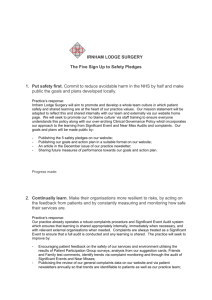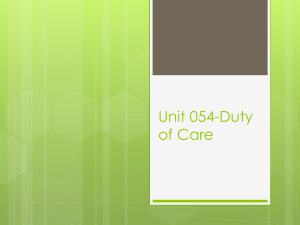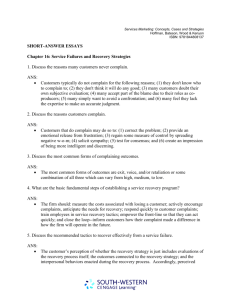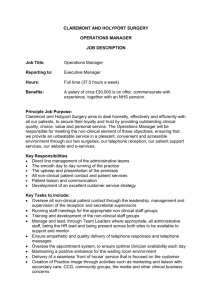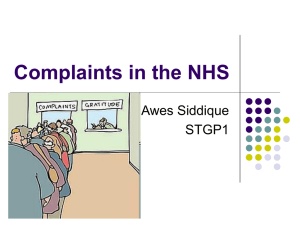Chapter 6- OK. No problem!
advertisement
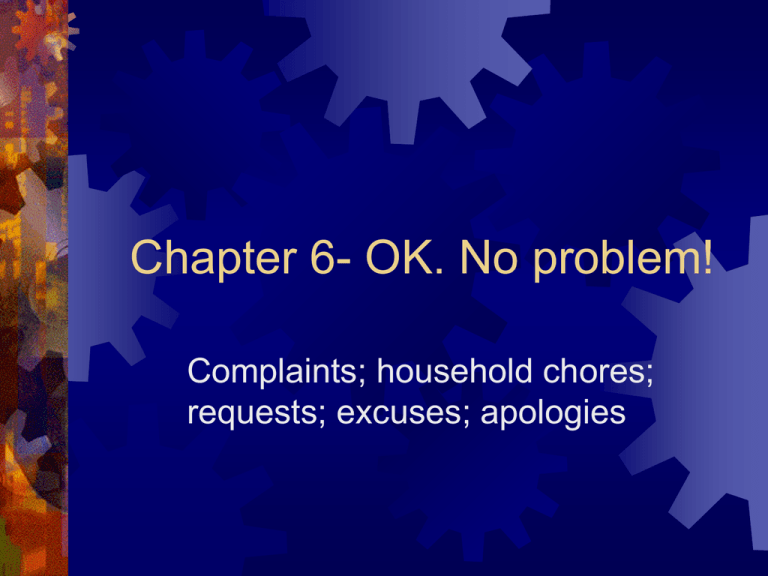
Chapter 6- OK. No problem! Complaints; household chores; requests; excuses; apologies Complaints Group A-Talk about complaints that parents have about teenagers. Group B- Talk about complaints that teenagers have about parents. Common Complaints Parents Have About Teenagers Don’t help out around the house Don’t listen to our advice Have strange friends Dress badly and have ugly hairstyles Don’t study enough Common Complaints Teens Have About Parents Nag about household chores Don’t like my friends Criticize my appearance Bother me about homework Always tell me what to do Comparing Complaints Which complaints seem reasonable? Which complaints seem unreasonable? Why? Listening- “Turn Down the TV!” Listen Listen and practice. to the rest of the conversation. What complaints do Jason and Lisa have about their parents? What is this sign? What are these signs? Two-part verbs: Commands Turn down the TV. Turn the TV down. Turn it down. Pick up your things. Pick your things up. Pick them up. “Will”- Respond to Requests When you are responding to request, use “will” to explain that you will do it in the future. Examples: Please turn down the music. Ok. I’ll turn it down. I’ll pick my clothes up. What do these signs mean? Create new “International Signs” based on two and three word verbs (“commands”). Pick up your room. Get out of the garden, rabbit! Don’t eat salt! Turn in your homework by 3 pm. Do not turn on the lights! Warm-up Put your things in a bag. In your group, have people create a story based on the things in the bag using two and three word verbs. Household Chores What requests can you make in each of these rooms? 1. The kitchen 2. The bathroom 3. The living room 4. The bedroom Take turns making the requests and respond by giving an unusual exercise. Listening- “Family Life” Listen to the results of a survey about family life. For each question, write men (M), women (W), boys (B), or girls (G). Listen again. According to the survey, what specific chores do men, women, boys, and girls usually do? Who does these things in your family? Requests with modals To show degrees of requests, we can use various modal verbs. Form: Modal + simple form of verb Can you turn the stereo off? Could you close the door, please? Would you please take your garbage out? Could is more polite than can, and would is quite formal. Would you mind… Form: Would you mind…+ gerund Would you mind turning the stereo down? Would you mind closing the door, please? Would you mind not putting your garbage here? Could you do me a favor roleplay Callers Receivers Apologies Different ways to apologize: Give an excuse: “I’m sorry. I didn’t realize…” Admit a mistake: “I forgot I left it there…” Make an offer: “I’ll take it out right now.” Make a promise: “I’ll promise I’ll…/I’ll make sure to…” Apologies Think of three complaints you have about your neighbors. Write three requests you want to make Garbage, guests, noise, parking, pets, security Making Apologies Take turns making your requests. The “neighbor” should apologize by giving an excuse, admitting a mistake, or making an offer or promise.
